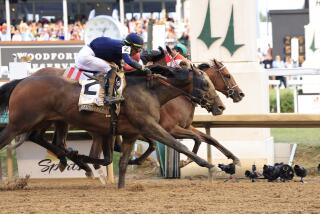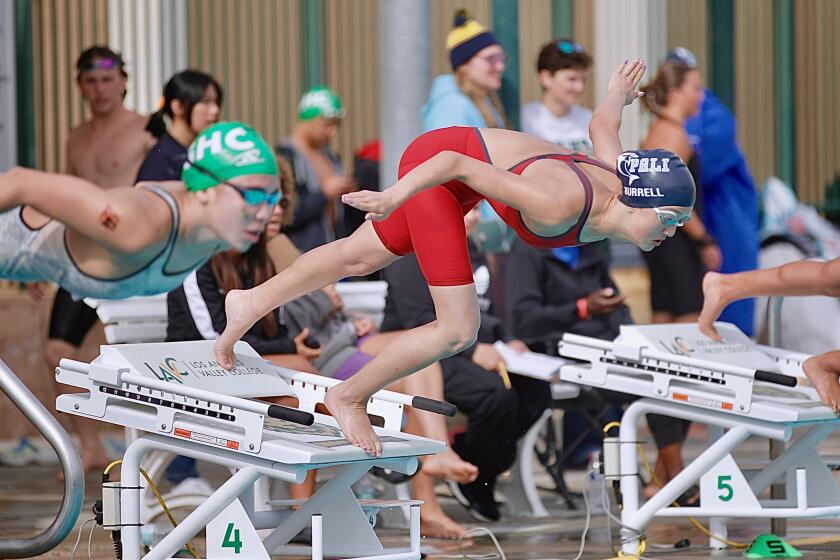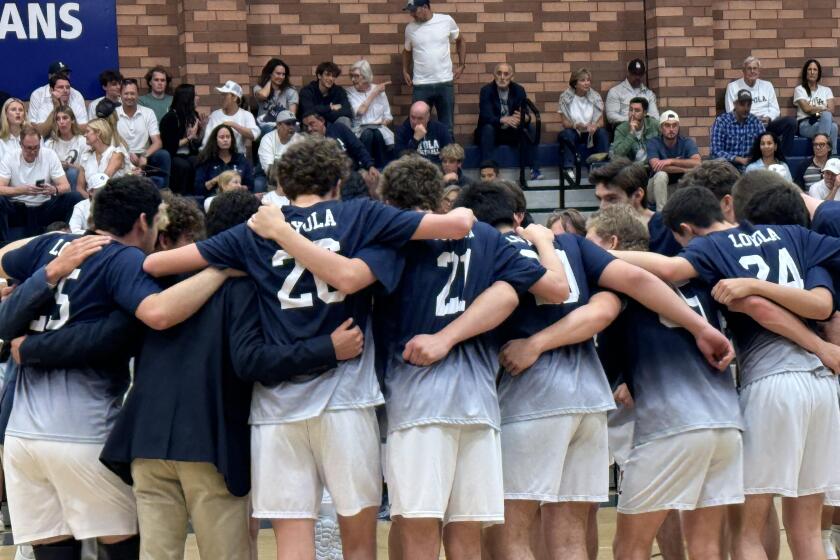Commentary : Racing Needs to Appeal for Swifter Justice
When jockey Rafael Arroyave was given a 60-day suspension for a pair of unsatisfactory rides at Laurel, his case appeared to be a rarity -- one in which the sport’s system of justice worked swiftly even while his appeal is pending.
Far more typical is the case of Peter Ferriola, New York’s top race-winning trainer, who had three horses caught with positive drug tests in the fall. Ferriola has appealed to the New York State Racing and Wagering Board, and the appeal case has dragged on and on. Ferriola’s attorney claims he has a key witness who won’t be able to testify until the end of April. Meanwhile, Ferriola continues to win races at a phenomenal rate. Since the drug charges were made, his horses have earned more than $1 million.
Even for routine violations, racing’s alleged offenders routinely use delaying tactics. When jockeys are charged with a riding infraction and draw a suspension that might cost them an important mount, they will appeal so that they can serve the penalty at a time they find more convenient.
Jockey Ron Franklin is appealing a recent suspension because he has been winning a lot of races lately and doesn’t want to ruin his momentum. Even he acknowledges that the purpose of his appeal to the Maryland Racing Commission is to buy himself a little time.
Horse racing, in short, faces the same kinds of problems in its system of justice as society as a whole. “The issue,” said Tom Aronson of the American Horse Council, “is rights versus integrity. There are certain due-process rights to which an individual is entitled that cut against the industry’s desire to quash wrongdoing. And I don’t think there are any clear answers to the questions.”
People wrestling with the issue of crime, punishments and individual rights might take a close look at the case of Arroyave. The jockey had given what appeared to be a couple of distinctly unenergetic rides on the horse De Douceur before the 3 year old displayed a sharp form reversal and won at Laurel on Feb. 4.
One week later the stewards had reviewed the films of his performances and slapped him with a 60-day ban. People who lost their money because of De Douceur’s erratic form might take some small satisfaction that justice was done. But they might be maddened to know that Arroyave was permitted to ride in Maryland while he was awaiting trial on a criminal charge in another state.
On the night of Aug. 12, a steward at the Birmingham Turf Club thought he saw something odd happen after a race was run; the winning jockey handed an object to the horse’s trainer. The object, it was alleged, was an electrical device, a “battery,” used to stimulate a horse. The next day the stewards suspended the jockey, Rafael Arroyave. The next month they held a hearing and imposed a suspension of two years.
Arroyave’s lawyer filed an appeal with the Birmingham Racing Commission, which at the time had a quirky rule on its books. It required that the commission grant a hearing within 48 hours, or the stay of a suspension was automatic.
“I was served with the request for a stay on a Friday afternoon, and it wasn’t practical for us to notify the members and have a hearing within 48 hours,” said the commission’s executive secretary, Larry B. Eliason. The timing, he assumed, was no accident: “I think his lawyer had a clock and a calendar.”
Shortly thereafter, Eliason related, the management of the track banned Arroyave from setting foot on the grounds of the track -- an exercise of their private-property rights that courts have consistently supported. But he said the commission did not set a date for a new hearing to Arroyave’s appeal.
“Possessing an electrical device is a criminal offense; he had been arrested and posted bond,” Eliason said. “The criminal charge has precedence in the law over an administrative charge.” So the commission had to wait for the district attorney’s office to act, and the D.A.’s office postponed the trial after originally scheduling it for early February. Arroyave remained in legal limbo.
But the jockey was no longer Birmingham’s problem. After Arroyave had obtained the stay of his suspension, Eliason said, “The next thing anybody knew of his whereabouts he was at Pimlico.”
And Maryland officials had no legal basis to keep him out. “With a stay, he wasn’t suspended in Alabama,” said Bill Furey, chairman of the racing commission, “and we had no basis to impose reciprocity.” Track management could have barred him arbitrarily, as Birmingham had done.
But Frank DeFrancis, the president of Pimlico and Laurel, didn’t like the idea. “This gets into the essence of our judicial system,” said DeFrancis, who is a lawyer. “An individual is innocent until he is proved guilty. In this alleged violation he had appealed, and Alabama hadn’t acted promptly in hearing the appeal.”
Arroyave’s rights were protected. But what about the interests of Maryland’s bettors and the integrity of the sport? DeFrancis was not second-guessing his decision to let the jockey ride here. The fault, he thought, was with Alabama’s dilatory handling of the case. By contrast, he thought that Maryland’s actions were exemplary.
After Laurel’s stewards held their hearing and imposed the 60-day suspension, Arroyave appealed to the racing commission and asked for a stay. The commission said it would hear the appeal promptly -- the date has been set for March 16 -- but denied the request for a stay. “That is the point where the public’s rights are protected,” DeFrancis said. “It’s a close balancing out of interests.”
This type of balancing act is one that racing officials around the country must learn to perform better than they do now. And the key is probably to act quickly and to keep appeals from dragging on endlessly (as Ferriola’s has), so that justice delayed doesn’t become justice denied.
More to Read
Get our high school sports newsletter
Prep Rally is devoted to the SoCal high school sports experience, bringing you scores, stories and a behind-the-scenes look at what makes prep sports so popular.
You may occasionally receive promotional content from the Los Angeles Times.






